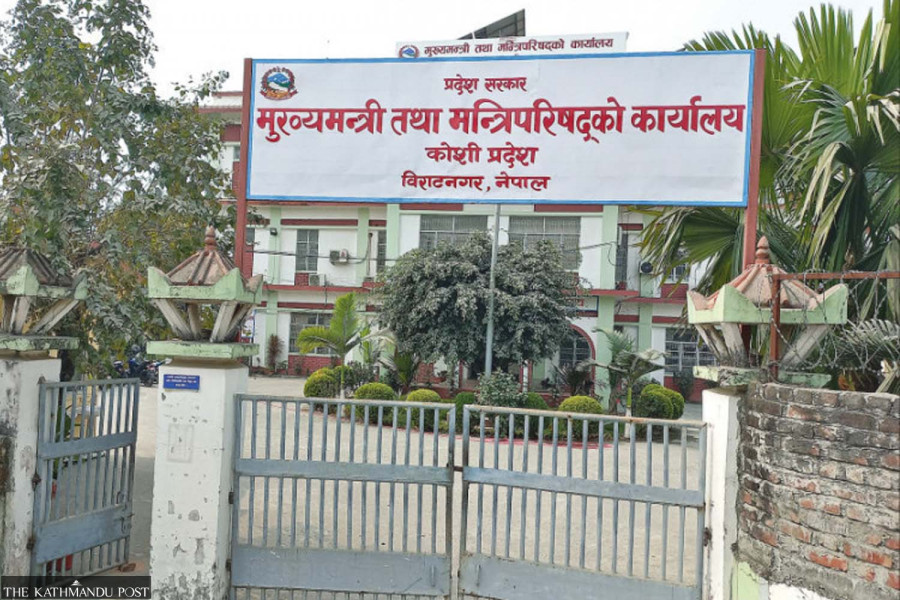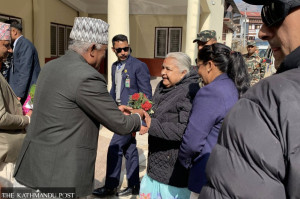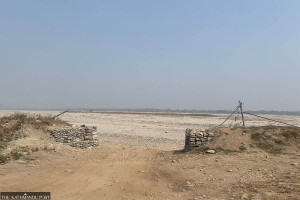Koshi Province
Koshi lawmakers deny possibility of mid-term elections
UML leaders want to form government as the largest party while others see a chance for an all-party coalition.
Nishan Khatiwada
After the Supreme Court issued an interim order for a second time in the name of the Uddhav Thapa-led Koshi provincial government not to take any important decisions, speculations are rife on the chances of mid-term polls in the province.
The court on Thursday ruled that the vote of confidence secured by the chief minister on Monday was unconstitutional. The Thapa government has now been reduced to a caretaker.
This is the second time in a month that the Supreme Court termed the formation of the provincial government led by Congress leader Thapa unconstitutional. On July 27, the court had ordered the Koshi Province head and the Speaker of the assembly to form the new government within seven days, terming the Thapa-led Cabinet unconstitutional.
Early election in the province is widely anticipated even as ruling and opposition lawmakers of the province deny the possibility.
Binod Rai, Nepali Congress assembly member in Koshi, said the ruling coalition—despite having such options as filing a case against the deputy Speaker for her reluctance to chair the assembly—had hurried to test the floor. Rai denied that Koshi was heading towards mid-term polls.
“The government formation process will be settled under Article 168(5) of the Constitution. There is a high chance of an all-party government,” Rai said.
If the court issues a final verdict in line with the interim order, the largest party in the provincial assembly, CPN-UML, will form the new government as per Article 168(3) of the constitution. The Article provisions that if a government cannot be formed under 168 (2), the provincial head appoints as chief minister the parliamentary party leader of the party with most members in the assembly. The chief minister thus appointed has to seek a vote of confidence within 30 days of appointment.
If the chief minister appointed under Article 168 (3) is unable to secure a vote of confidence, then the government can be formed under 168 (5), giving lawmakers a chance to present a ground on which he or she can get the confidence of the assembly. Under this provision, the province head appoints a member as chief minister. For that, a provincial member doesn’t need to be the parliamentary leader of a political party to become chief minister. The provincial government head thus appointed also needs to secure a vote of confidence within a month.
If all these provisions cannot result in a government, Koshi will have no option but to go for midterm elections.
Durga Prasad Chapagain, a lawmaker from the Maoist Centre, said even if the court issues a final verdict in line with the interim order, midterm polls are unlikely because a consensus will be reached among the political parties to form a government under Article 168(3) or 168(5). “There will be an agreement among the political parties for the stability of the province,” Chapagain told the Post.
Tricky balance of power makes the government formation process in Koshi knotty. In the 93-member assembly, an aspirant for chief minister must secure 47 votes to secure the position. The Congress-led coalition has 47 seats in the assembly. If a ruling party member has to chair the assembly, it will be one lawmaker shy of the majority as any member chairing the meeting can’t cast a vote. The Supreme Court has invalidated the Thapa-led government twice citing the same constitutional provision. The other alliance of the CPN-UML (40 seats) and the Rastriya Prajatantra Party (6 seats) has 46 members.
Despite the tricky numbers, Congress lawmaker Rai said all parties must come together to stop the province from going to the mid-term in light of mounting public frustration over a provincial structure that has failed to deliver the expected result. “Moreover, many lawmakers including myself are not ready to contest the [mid-term] polls,” he revealed.
On Monday, the Congress parliamentary party leader Thapa claimed he had secured teh vote of confidence after Congress’ Israil Mansuri, who was chairing the assembly, voted in his favour. Claiming that Mansuri’s vote was unconstitutional, UML parliamentary party leader and former chief minister Hikmat Karki moved the Supreme Court on Wednesday.
On Thursday, the top court issued an interim order saying that the vote of confidence was unconstitutional and asking the Thapa-led Cabinet not to take any decision with long-term effect.
UML Chief Whip Rewati Raman Bhandari said the government will now be formed based on Article 168(3) of the constitution. Bhandari hopes that there will be an agreement among the political parties within a month when the UML chief minister has to secure a vote of confidence. “We are hopeful that the UML will now form a stable government with the support of other political parties,” said Bhandari.
He added: “We are also open to cooperation and collaboration with all political parties for the same.”
Despite the intent of provincial lawmakers and leaders, provincial politics has been largely shaped by the political manoeuvrings in Kathmandu. Critics accuse the central leaders of meddling in the provinces.
Political analyst Bhaskar Gautam said politics in Koshi revolves around the stand of political leaders in the national capital. The problem has exacerbated as the parties can neither form a government on their own, nor are they ready to support the opposing forces in government formation.
That will not be the case now, said Rai. “Whatever the central leaders say, it won’t matter this time around. The province will not go to mid-term polls. A majority of the lawmakers will form a government under 168(5).”
“If the UML cannot form the government, they must pave the way for the ruling coalition to do so or there could be an all-party government. These are the two options now. But the parties’ rigid stance has prompted fears of a mid-term poll,” Gautam said.
“Going to the midterms just because there is a mad rush for power will set bad precedent,” he added.




 11.07°C Kathmandu
11.07°C Kathmandu











